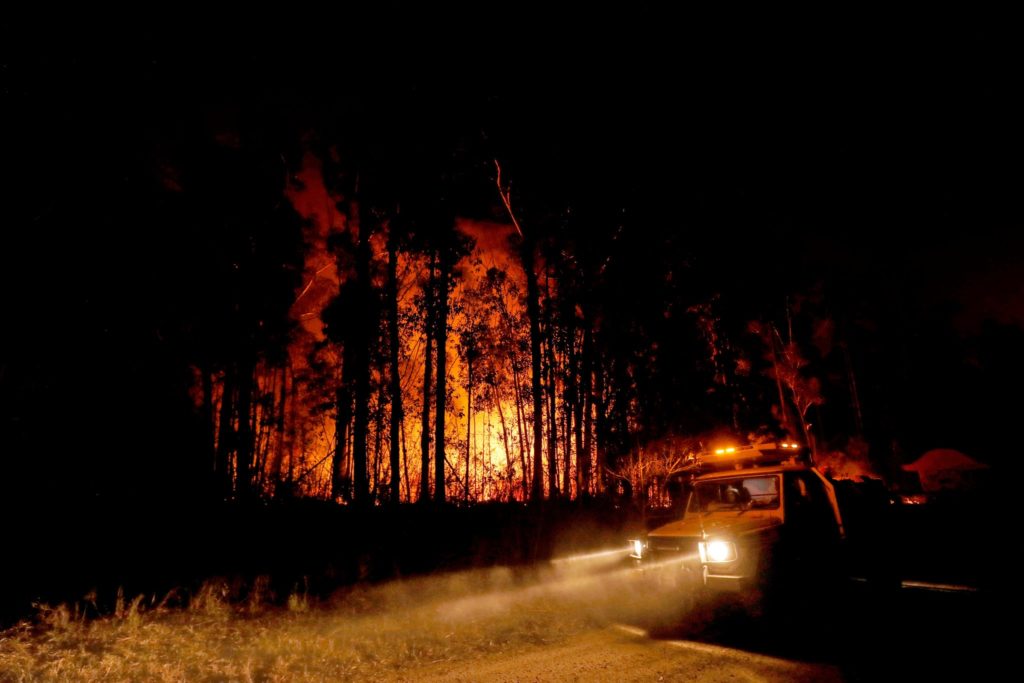
Australia is ablaze.
As an environmental historian, I should have a well-formed intellectual response to the crisis. Instead, I find myself grief-stricken, furious, paralysed, and eerily certain that the worst of times lie ahead of us not behind us. But staying silent in a crisis is a political stance too, and it’s one I can not and will not take.
I am watching the fires from California. In 2018 here, we experienced the most extreme fire season in the region’s post-invasion recorded history. Almost 2000 acres burned. Back home in Australia, with summer barely begun, more than six times that area has already burned and we’re hardly able to keep count of the losses. Time Magazine put it at 12.35 million acres a few days ago and that number is already well out of date. There are 39 fires in Victoria, more than 150 in New South Wales, and more than a third of South Australia’s precious Kangaroo Island is destroyed. Losses of lives, wilderness, and property are rising with every smoke-choked breath. Queensland, my home state, suffered unimaginable losses before summer began, and even Tasmania is on fire.
A government in denial
The Commonwealth Government of Australia’s ” pre-eminent public sector geoscience organisation” webpage about bushfire makes no mention of climate change as a root cause of extreme weather and cataclysmic fire events. Our Prime Minister, Scott Morrison, has suggested that watching the cricket will help fellow Australians to not get too stressed about the fires. I am sickened watching him force non-consensual handshakes on traumatised fire survivors, seeing his just-released political ad campaign inviting donations not to fire relief but to his conservative political party, listening to his insistence on the routine nature of these fires, and witnessing his ongoing refusal to implement policy measures that go anywhere near addressing our nation’s role in turning the tide on climate change.
Our next federal election won’t be for a while, so let’s promise each other to make sure that what’s happening now is not forgotten when the nation next goes to the polls. In the meantime, contacting politicians, joining local climate action campaigns, contributing to relief efforts, and making climate-responsible lifestyle choices are a few obligations that we can – and must – commit to.
Indigenous knowledge
These fires are what futurists would call a “wicked problem”: multiple causative factors, complexities in levels of government and coordination of relief efforts, and the overarching issue that our country is hotter than it’s ever been before. All of it is a symptom of a broken planet that we humans destroyed, mostly in the pursuit of what some might call progress, and often because our systems invited us to think short term, not play a long game.
But Australia has a saving grace. We are the continent that has sustained the longest-surviving human civilisation on the planet. For more than 60,000 years, Indigenous Australian peoples have been exercising custodianship of Country, and central to their responsibilities and cultural practices has been the diligent use of fire. It is time now for us white folks to sit at the feet of indigenous knowledge holders and to learn from them how to manage fire in culturally and ecologically appropriate ways. Should have done this long ago, didn’t, and I am hopeful that we might do so at last.
Personal Action
Every single Australian has a story of death, illness, terror, loss, or crisis from this fire season. It has touched us all, directly, indirectly, existentially. Those of us out of reach of flames feel guilty for the pain we feel, and those within them are fighting with all they have just to survive. Most of the nation is so tinderbox dry, so hot, so vulnerable, that the ticking time bomb of fire eruption looms large and close, day after day.
Personal action looks like donating money and goods, making more responsible life choices, and extending a hand of kindness to each other, as we Australians can do so beautifully at the best and the worst of times. Personal action is imperative to adequately address this crisis and it will be – I hope – some salve on the wounds that we all feel as our country heaves through what is just one of the many apocalypses of our generation, that we and our forebears made, and that we and our children must now, somehow, survive.
Links
Red Cross Disaster Relief: https://www.redcross.org.au/campaigns/disaster-relief-and-recovery-donate
Wildlife Rescue: https://www.wires.org.au/donate/ways-to-help
Donate to the Victorian Government/Bendigo Bank/Salvation Army appeal: https://www.communityenterprisefoundation.com.au/make-a-donation/bushfire-disaster-appeal/
Support the Guardian and the ABC who are tirelessly and accurately reporting on the fire crisis: https://www.abcfriends.org.au/donate and https://support.theguardian.com/au/contribute
Sources:
https://time.com/5758186/australia-bushfire-size/
https://www.ga.gov.au/scientific-topics/community-safety/bushfire
https://www.news.com.au/sport/cricket/scott-morrison-slammed-for-insensitive-comments-about-australian-bushfires/news-story/c000756d5f2253495e3fd9fdc2042ac6
Victoria
Vivienne Huddleston